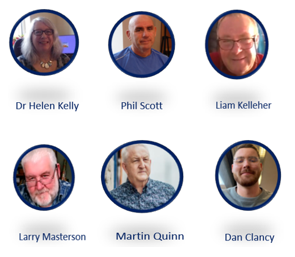Co-designing a website to raise awareness of aphasia

A new website was launched during International World Stroke Awareness week and the co-design team was also invited to present this work for the Advances in Communication and Swallowing journal’s Autumn webinar on 6th November.
This unique website highlights the impact of aphasia on people’s lives, Dr Kelly’s UCC Aphasia Home Café, gives hope through video testimonies of people living successfully with aphasia and provides links to resources useful for stroke survivors and their families.
Over 100 million people living in the world have experienced a stroke (www.world-stroke.org) and approximately 7500 people in Ireland have a stroke every year. Stroke is life changing. Many people don’t return to the same life before their stroke and need ongoing lifetime support for physical, cognitive, communication, and psycho-social disabilities. One such disability is Aphasia. More than 1/3 of stroke survivors experience aphasia, a post-stroke communication disability caused by damage to the language areas of the brain.
Aphasia does not affect intelligence but can affect a person’s ability to understand what they read and hear and to express themselves when speaking and writing. Almost everything that we do in our daily lives involves communication so there are daily challenges for people living with post-stroke aphasia. For example, traffic road signs, watching the TV, listening to the radio, reading newspapers, searching for information on the Internet. Communication also has a central role in building and developing relationships and is a component of many hobbies and interests. Aphasia often results in social isolation and loneliness with the rate of depression being higher for people with post-stroke aphasia when compared with stroke survivors who do not have aphasia.
Despite the numbers of people living with aphasia, research shows that the general public does not know what aphasia is. Stroke survivors and their families also report a need for more understanding about aphasia and how to access relevant supports.
Dr Helen Kelly (School of Clinical Therapies) invited stroke survivors with aphasia and a student from Digital Humanities to co-design a website to raise awareness of aphasia. Informed by the co-design team of stroke survivors with aphasia, this unique website highlights the impact of aphasia on people’s lives, Dr Kelly’s UCC Aphasia Home Café, gives hope through video testimonies of people living successfully with aphasia and provides links to resources useful for stroke survivors and their families.
The website was launched during International World Stroke Awareness week and the co-design team was also invited to present this work for the Advances in Communication and Swallowing journal’s Autumn webinar on 6th November.
Website: https://www.ucc.ie/en/aphasiacafe/
Facebook: https://www.facebook.com/AphasiaCafe
X (Twitter): @DrHelenKelly_ and @AphasiaHomeCafe
